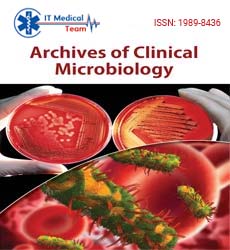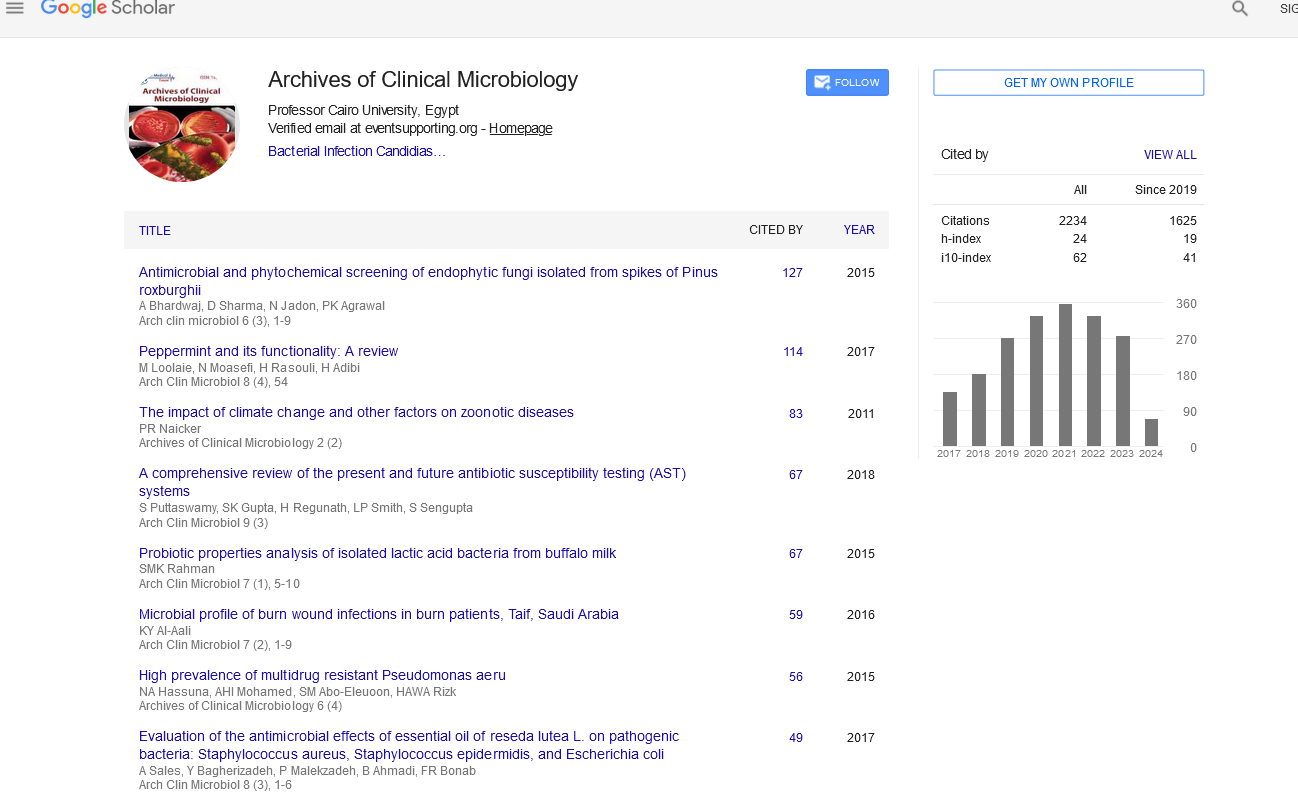Perspective - (2024) Volume 15, Issue 4
Challenges in Diagnosing and Treating Multidrug-Resistant Tuberculosis
Richard Elson*
Department of Microbiology and Immunology, University of Oxford, Oxford, United Kingdom
*Correspondence:
Richard Elson, Department of Microbiology and Immunology, University of Oxford, Oxford,
United Kingdom,
Email:
Received: 18-Jun-2024, Manuscript No. IPACM-24-14967;
Editor assigned: 21-Jun-2024, Pre QC No. IPACM-24-14967 (PQ);
Reviewed: 05-Jul-2024, QC No. IPACM-24-14967;
Revised: 15-Jul-2024, Manuscript No. IPACM-24-14967 (R);
Published:
22-Jul-2024
Introduction
Multidrug-Resistant Tuberculosis (MDR-TB) poses a formidable
challenge to global Tuberculosis (TB) control efforts,
characterized by resistance to first-line anti-TB medications and
requiring prolonged, complex treatment regimens. This article
explores the epidemiology of MDR-TB, diagnostic challenges,
treatment strategies, socioeconomic impacts, and global health
implications in combating this resilient infectious disease.
Multidrug-Resistant Tuberculosis (MDR-TB) represents a
critical subset of tuberculosis infections resistant to at least
isoniazid and rifampicin, the two most potent first-line anti-TB
drugs. MDR-TB complicates TB management due to limited
treatment options, prolonged therapy duration, higher
treatment costs, and increased risks of treatment failure and
mortality. Addressing the challenges of diagnosing and treating
MDR-TB is essential to achieving global TB control targets and
reducing the burden of drug-resistant tuberculosis worldwide.
Description
Epidemiology of multidrug-resistant tuberculosis
The global burden of MDR-TB continues to pose significant
public health challenges:
Prevalence and incidence: MDR-TB affects approximately
3.4% of new TB cases and 18% of previously treated TB cases
globally, with varying regional prevalence influenced by
healthcare infrastructure, TB control measures, and antimicrobial
resistance patterns.
Emerging drug resistance: Extensively Drug-Resistant
Tuberculosis (XDR-TB), characterized by resistance to
fluoroquinolones and at least one second-line injectable drug,
further complicates treatment outcomes and limits therapeutic
options, particularly in resource-limited settings.
Transmission dynamics: Nosocomial transmission, inadequate
infection control measures, incomplete treatment regimens, and
suboptimal adherence contribute to the spread of drug-resistant
TB strains within communities and healthcare settings,
perpetuating the cycle of transmission and resistance
amplification.
Diagnostic challenges in MDR-TB
The diagnosis of MDR-TB presents several clinical and
laboratory challenges:
Laboratory capacity: Deficiencies in laboratory infrastructure,
limited access to molecular diagnostic technologies (e.g.,
GeneXpert MTB/RIF assay), and delays in culture and Drug
Susceptibility Testing (DST) contribute to delayed diagnosis and
treatment initiation for MDR-TB patients.
Complexity of drug resistance profiles: MDR-TB strains exhibit
diverse resistance patterns, requiring comprehensive drug
susceptibility testing to guide individualized treatment regimens
and minimize risks of treatment failure and acquired resistance.
Co-infections and comorbidities: TB-HIV co-infection, diabetes
mellitus, and immunosuppressive conditions complicate MDR-TB
diagnosis and treatment management, necessitating integrated
healthcare approaches and multidisciplinary care teams to
address overlapping clinical complexities.
Treatment strategies for MDR-TB
Managing MDR-TB necessitates specialized treatment
protocols and patient-centered care strategies:
Second line anti-TB drugs: Treatment of MDR-TB involves
prolonged regimens (typically 18-24 months) with second-line
anti-TB medications, including fluoroquinolones, injectable
agents (e.g., kanamycin, capreomycin), and newer drugs (e.g.,
bedaquiline, linezolid) guided by individualized DST results and
treatment response monitoring.
Adverse drug reactions: Second-line anti-TB drugs are
associated with significant adverse effects, including ototoxicity,
nephrotoxicity, and gastrointestinal disturbances, necessitating
close monitoring, supportive care interventions, and adherence
support to optimize treatment tolerability and outcomes.
Directly Observed Therapy (DOT): DOT strategies, ensuring
supervised medication administration and patient adherence,
are essential components of MDR-TB treatment adherence
support programs, promoting treatment completion and
reducing risks of treatment failure and acquired resistance.
Socioeconomic impacts and health system challenges
MDR-TB imposes substantial socioeconomic burdens and
health system challenges:
Economic costs: The direct costs of MDR-TB treatment are
substantially higher than drug sensitive TB, encompassing
expenses related to second line drugs, diagnostic tests,
hospitalizations, and supportive care interventions, imposing
financial hardships on individuals, families, and healthcare
systems.
Stigma and social marginalization: MDR-TB stigma,
misconceptions about transmission risks, and discrimination
against affected individuals hinder healthcare seeking behaviors,
exacerbate mental health concerns, and impede community
engagement in TB prevention and treatment initiatives.
Health system resilience: Strengthening health system
capacities, enhancing laboratory networks, integrating MDR-TB
services into primary healthcare settings, and expanding access
to diagnostic technologies and treatment regimens are critical to
achieving sustainable TB control and mitigating the impact of
drug-resistant tuberculosis on public health.
Global health implications and strategic interventions
Addressing the challenges of MDR-TB requires coordinated
global efforts and strategic interventions:
Antimicrobial resistance surveillance: Strengthening
antimicrobial resistance surveillance systems, harmonizing DST
protocols, and facilitating global data sharing promote early
detection of drug-resistant TB strains, inform evidence-based
treatment guidelines, and guide TB control policies.
Research and innovation: Investing in research and
development of novel anti-TB drugs, diagnostic technologies
(e.g., point of care tests, molecular assays), and therapeutic
regimens tailored to regional epidemiological profiles enhances
treatment efficacy, shortens treatment duration, and improves
patient outcomes in MDR-TB endemic regions.
Patient centered care: Empowering patients through
education, counseling, community-based support networks, and
adherence counseling fosters treatment adherence, reduces
treatment interruptions, and promotes successful treatment
outcomes in MDR-TB management.
Conclusion
Multidrug-resistant tuberculosis poses complex challenges to
global TB control efforts, characterized by diagnostic
complexities, prolonged treatment regimens, socioeconomic
impacts, and healthcare system strains. Addressing the
epidemiological, diagnostic, and treatment challenges of MDR-TB
requires sustained investments in healthcare infrastructure,
research and development, and multisectoral collaborations to
achieve equitable access to effective TB prevention, diagnosis,
and treatment services.
By leveraging innovative diagnostic technologies, expanding
access to second line anti-TB medications, and strengthening
health system capacities, stakeholders can mitigate the impact
of drug-resistant tuberculosis, improve patient outcomes, and
advance towards global TB elimination goals in the post 2030
era.
Citation: Elson R (2024) Challenges in Diagnosing and Treating Multidrug-Resistant Tuberculosis. Arch Clin Microbiol Vol:15 No:4





